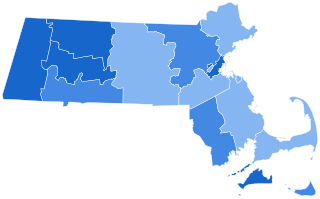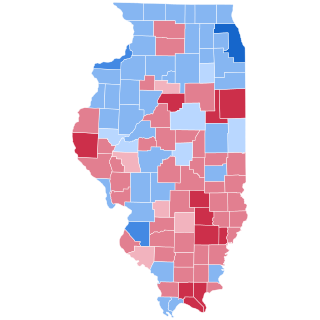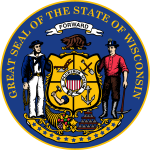The Delaware Democratic Party (DelDems) is the affiliate of the Democratic Party in the U.S. state of Delaware. It is headquartered in New Castle County and chaired by Erik Raser-Schramm.

The 2008 United States House of Representatives elections in New York were held on November 4, 2008, to elect the 29 U.S. representatives from the State of New York, one from each of the state's 29 congressional districts. state of New York in the United States House of Representatives. New York has 29 seats in the House, apportioned according to the 2000 United States census. Representatives are elected for two-year terms; those elected will serve in the 111th Congress from January 4, 2009, until January 3, 2011. The election coincided with the 2008 U.S. presidential election in which Democrat Barack Obama defeated Republican John McCain by a wide margin.

The 2008 United States elections were held on Tuesday, November 4, 2008, during the war on terror and the onset of the Great Recession. It was considered a Democratic wave election, with Democratic Senator Barack Obama of Illinois defeating Senator John McCain of Arizona by a wide margin, and the Democrats bolstering their majorities in both chambers of Congress, thereby marking the first time since 1992 in which the Democrats won Congress and the presidency in one election.

Elections in the U.S. state of New Hampshire are held at national, state and local level. The state holds the first presidential primary in the national cycle. Elections for a range of state positions coincide with biennial elections for the House of Representatives.

The 2008 United States presidential election in Massachusetts took place, as in all 50 states and D.C., as part of the 2008 United States presidential election of November 4, 2008. Voters chose 12 representatives, or electors to the Electoral College, who, in turn, voted for the office of president and vice president.

Georgia's state elections were held on November 4, 2008. The primary elections were held on February 5, also known as Super Tuesday.

The 2008 United States presidential election in Wisconsin took place on November 4, 2008, as part of the 2008 United States presidential election in which all 50 states plus the District of Columbia participated. State voters chose 10 electors to represent them in the Electoral College via a popular vote pitting Democratic U.S. Senator from Illinois Barack Obama, and his running mate U.S. Senator from Delaware Joe Biden, against Republican challenger and U.S. Senator from Arizona John McCain and his running mate, Alaska Governor Sarah Palin.

The 2008 United States presidential election in Oklahoma took place on November 4, 2008, and was part of the 2008 United States presidential election. Voters chose seven representatives, or electors to the Electoral College, who voted for president and vice president.

The 2008 United States presidential election in North Carolina was part of the national event on November 4, 2008, throughout all 50 states and D.C. In North Carolina, voters chose 15 representatives, or electors, to the Electoral College, who voted for president and vice president.

The 2008 United States presidential election in Connecticut took place on November 4, 2008, and was part of the 2008 United States presidential election. Voters chose seven representatives, or electors to the Electoral College, who voted for president and vice president.

The 2008 United States presidential election in Illinois took place on November 4, 2008, and was part of the 2008 United States presidential election. Voters chose 21 representatives, or electors to the Electoral College, who voted for president and vice president.

The 2008 United States presidential election in West Virginia took place on November 4, 2008, and was part of the 2008 United States presidential election. Voters chose 5 representatives, or electors to the Electoral College, who voted for president and vice president.

The 2008 United States presidential election in Minnesota took place on November 4, 2008, and was part of the 2008 United States presidential election. Voters chose ten representatives, or electors to the Electoral College, who voted for president and vice president.

The 2012 United States elections took place on November 6, 2012. Democratic President Barack Obama won reelection to a second term and the Democrats gained seats in both chambers of Congress, retaining control of the Senate even though the Republican Party retained control of the House of Representatives. As of 2024, this is the most recent election cycle in which neither the presidency nor a chamber of Congress changed partisan control, and the last time that the party that won the presidency simultaneously gained seats in both the House of Representatives and the Senate.

The 2010 Arizona state elections were held on November 2, 2010, with primaries on August 24, 2010. These include gubernatorial and both sides of Congress. A special election was also on May 18 for Proposition 100.

The 2012 United States presidential election in Pennsylvania took place on November 6, 2012, as part of the 2012 United States presidential election in which all 50 states plus the District of Columbia participated. The primary election to select the Democratic and Republican candidates had been held on April 24, 2012. Pennsylvania voters chose 20 electors to represent them in the Electoral College via a popular vote pitting incumbent Democratic President Barack Obama and his running mate, Vice President Joe Biden, against Republican challenger and former Massachusetts Governor Mitt Romney and his running mate, Congressman Paul Ryan. Pennsylvania's electoral vote number was a reduction from the 2008 delegation, which had 21 electors. This change was due to reapportionment following the 2010 United States Census. Pennsylvania's 20 electoral votes are allotted on a winner-take-all basis.

The 2016 United States elections were held on Tuesday, November 8, 2016. Republican nominee Donald Trump defeated Democratic former Secretary of State Hillary Clinton in the presidential election, while Republicans retained control of Congress. This marked the first and most recent time Republicans won or held unified control of the presidency and Congress since 2004.

The 2020 Wisconsin Fall general election was held in the U.S. state of Wisconsin on November 3, 2020. All of Wisconsin's eight seats in the United States House of Representatives were up for election, as well as sixteen seats in the Wisconsin State Senate and all 99 seats in the Wisconsin State Assembly. Voters also chose ten electors to represent them in the Electoral College, which then participated in selecting the president of the United States. The 2020 Fall partisan primary was held on August 11, 2020.

Elections were held in Illinois on Tuesday, November 3, 1936.

The 2012 Wisconsin Fall General Election was held in the U.S. state of Wisconsin on November 6, 2012. One of Wisconsin's U.S. Senate seats and all of Wisconsin's eight seats in the United States House of Representatives were up for election, as well as sixteen seats in the Wisconsin State Senate and all 99 seats in the Wisconsin State Assembly. Voters also chose ten electors to represent them in the Electoral College, which then participated in selecting the president of the United States. The 2012 Fall Partisan Primary was held on August 14, 2012. In the presidential election, Wisconsin congressman Paul Ryan was the Republican nominee for Vice President of the United States.


















